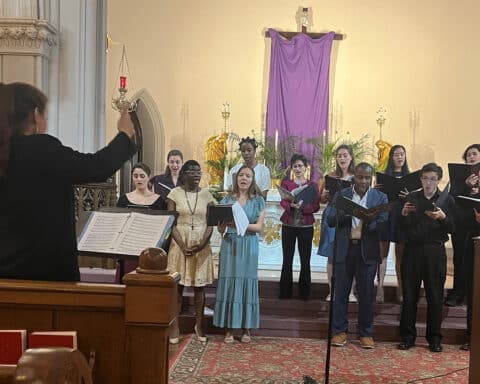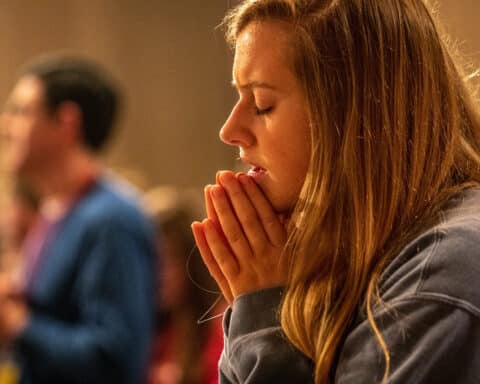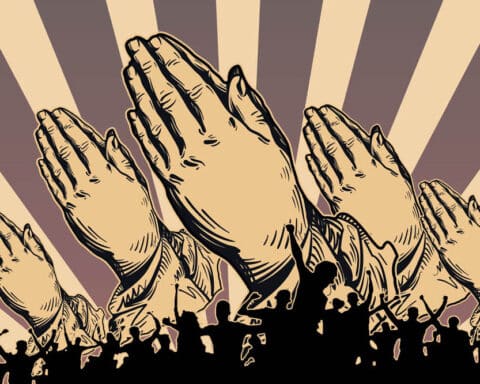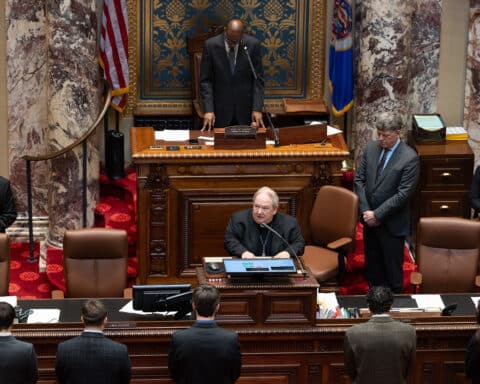Are you ready for a break? I know I am.
It’s been one of those years. And last year was one of those years, too. We’ve been through everything from Kabul to COVID, and we’re still not out of the woods with either of them. (And let’s not talk about the price of gas or the perpetual head-butting in Washington.) We’ve been fed up, locked down, masked over; we’ve rolled up our sleeves and logged onto Zoom and learned how to Slack and FaceTime and master the art of working in our underwear from home (while wearing a necktie when appearing on a computer screen, of course).
We’ve been watching too much TV and scrolling through too much social media. (You know it’s been too much when you gaze at your wife across the breakfast table and think she is starting to look and sound like Dr. Fauci.)
We need a break.
Better yet, how about a sabbatical?
Ah. “Sabbatical.” A magical, mysterious word — rooted, of course, in “sabbath.” Webster’s tells us it comes from the Greek word sabbaton. Sabbaton traces back to the Hebrew word shabbāth, meaning “rest.” It’s not unusual for people in academia to take an occasional sabbatical — a rest, or some time off for further study — and it’s also not uncommon for those in ministry.
I’ve known a few priests who have taken several months off to travel, study or just recharge their spiritual batteries. (Dioceses around the U.S. have different policies and programs to help make this possible.) But here’s the thing: You don’t need a Roman collar to have a sabbatical experience. It’s closer than you may realize. All of us can make a few simple choices that can leave us rested, reenergized and renewed.
Best of all, you don’t need to pack a bag or have a swab inserted in your nostril.
Want to take a private, spiritual sabbatical? Here are 10 ideas on how to make it happen.
1. Unplug

You can thank me later.
So much of the noise cluttering up our lives is coming from those little electronic wonders we carry with us all the time. They tell us everything we need to know — and a lot of what we don’t — incessantly. Enough already. If you can’t completely disconnect from electronics (and, as someone who makes his living publishing on them, I’d love you to stay connected somehow!), work on setting limits. Don’t read them during dinner. Don’t pay attention to them after 6 p.m. Reacquaint yourself with the art of personal conversation. Write letters — with paper and ink! Talk to people — in person! Read books — with covers and pages! You will be amazed.
There is something about the tactile, the real, the immediate. It is irreplaceable.
I don’t think human beings were made to function the way we do today; it’s just unnatural. Get back to basics. You’ll find your life becoming less stressful, more tranquil.
Looking for ways to spend the hours you no longer devote to texting, emailing, commenting and deleting? Try a little something we call “praying.”
2. Start a novena
 Or two. Take a few minutes in the morning or evening to pray for a special intention. Maybe you know someone in need or have a cause worth praying for. There are so many novenas to choose from — everyone from St. Jude to the Blessed Mother is waiting to hear from you — and many local parishes feature these devotions at the conclusion of daily Mass. Check them out.
Or two. Take a few minutes in the morning or evening to pray for a special intention. Maybe you know someone in need or have a cause worth praying for. There are so many novenas to choose from — everyone from St. Jude to the Blessed Mother is waiting to hear from you — and many local parishes feature these devotions at the conclusion of daily Mass. Check them out.
Interested in something simpler or more familiar? Break out the beads. A daily Rosary can leave you uplifted and renewed. Find a full five-decade Rosary too daunting? Start with just a decade. Take a few minutes at different intervals throughout the day to pray part of a Rosary. Or consider a chaplet — again, there are many variations to pray, including the Chaplet of Divine Mercy, usually prayed at 3 p.m. If you’d like some company to nudge you along on your spiritual journey, your parish may offer this or other devotions after Mass during the week.
3. Try to make time for daily Mass
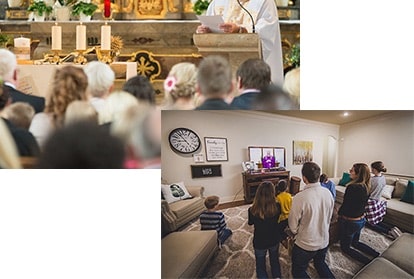
If your parish doesn’t offer daily Mass — or if you can’t get there at the right time — look online. (Another reason why you might not want to completely unplug!).
Many parishes (and a lot of Catholic websites) offer daily Mass or other devotions on their websites. Look around. The USCCB website also offers daily reflections that can give your day a boost and help you look at Scripture in a new way.
4. Get on your feet
Early on in the pandemic, when I was getting sick and tired of being at home at my desk day after day after day, I made it a habit to go outside and walk four blocks to 7-Eleven to get my morning coffee. One morning, I bumped into a parishioner.

“Going out to get my coffee,” I told her.
“What?” she said, surprised. “You don’t have a coffee machine at home?”
I explained that this was my excuse to get out of the house, stretch my legs and get a little fresh air. She admitted that made sense to her. And it still makes sense to me. It’s become my start-of-day “sneaker therapy.”
I eventually expanded my walking routine during the warmer months and started putting in a 45-minute trek every evening after dinner. Not only did it help me get in those famous “10,000 steps” (and I even lost some weight!) but it helped me clear my head and compose my thoughts. I’ve managed to do some of my best writing and praying while walking at twilight. (Homilies are somehow better when composed on your feet!)
Some nights, I’ll grab a rosary and work my way through it while walking the neighborhood and watching the sky change color. It’s like praying in God’s own chapel.
And taking the time to just walk can help you notice things you might otherwise miss — budding flowers, changing leaves, new neighbors. The unhurried serenity and rhythm of walking does wonders.
5. Meet new friends (or get reintroduced to old ones) in a book

Here’s a novel idea (ha!): Try it again.
In particular, consider some Catholic authors you might have overlooked or never encountered before. Check out the lives of saints, martyrs, priests and popes. Investigate Catholic book clubs — or, maybe, even start one in your parish.
Looking for something to ignite your spiritual imagination? The recent popes — John Paul II, Benedict XVI and Francis — have all published extraordinary (and often, extraordinarily readable and accessible) essays, encyclicals and reflections that can offer inspiring new ways of approaching our faith.
If you’re feeling even more daring, dip into poetry. There’s no better time for it. Not long ago, Anglican priest Tish Harrison Warren wrote in The New York Times about why poetry is crucial right now.
“In our age of social media,” she wrote, “words are often used as weapons. Poetry instead treats words with care. They are slowly fashioned into lanterns — things that can illuminate and guide. Debate certainly matters. Arguments matter. But when the urgent controversies of the day seem like all there is to say about life and death or love or God, poetry reminds me of those mysterious truths that can’t be reduced solely to linear thought.”
Poetry, in effect, can become a kind of prayer.
6. Pray for the world — or at least one small part of it — by fasting
Hey, it’s not just for Lent! Periodic fasting can and should be a form of prayer that helps to simplify our lives, focus our thoughts and enlarge our hearts for those in need.

“Fasting, experienced as a form of self-denial,” he said, “helps those who undertake it in simplicity of heart to rediscover God’s gift and to recognize that, created in his image and likeness, we find our fulfilment in him. In embracing the experience of poverty, those who fast make themselves poor with the poor and accumulate the treasure of a love both received and shared. In this way, fasting helps us to love God and our neighbor, inasmuch as love, as Saint Thomas Aquinas teaches, is a movement outwards that focuses our attention on others and considers them as one with ourselves.”
Looked at another with, in what might be considered “a sabbatical spirit,” fasting can help us look at the world and those around us with new eyes. We can come to cherish more deeply the gifts we have been given and seek ways to share those gifts with others.
7. Give the world the silent treatment
In many ways, this connects back to the first suggestion — unplug! — but takes it a step further. Detach in a more literal way from the daily noise of life. Find a time and place for complete silence. Dim the lights. Shut the door. And listen for what God might be trying to say to you.

Monks and mystics are good at this sort of thing, and Trappist writers like Basil Pennington, Thomas Keating and Thomas Merton have written extensively about the power of silence and mastering the art of prayer in empty chapels, in near-darkness, in the middle of nowhere, in the middle of the night.
It’s harder for the rest of us.
You might try investing in noise-cancelling headphones. If you want something simpler, look for opportunities right in your own home. Head for the bathroom, sit in the tub and just soak.
If you can, find a local church that’s open in the middle of the day, slip into a pew and just let go and let God.
Merton once wrote of that kind of experience: “My whole life becomes a prayer. My whole silence is full of prayer. The world of silence in which I am immersed contributes to my prayer.”
It worked for him. It can work for us, too.
8. Give the best gift you can: Yourself

I’ve always been humbled by the Gospel account of the widow who regularly came to the Temple to deposit just two small coins — “the widow’s mite” — all she had. As Jesus told his disciples, witnessing this generous gesture: “Amen, I say to you, this poor widow put in more than all the other contributors to the treasury. For they have all contributed from their surplus wealth, but she, from her poverty, has contributed all she had, her whole livelihood” (Mk 12:43) It is not only a lesson in selflessness, but also in the power of compassion.
Want to feel better about yourself? Give more to those who have less.
Want to gain perspective on your own life? Consider how you can help those in need.
Find some time to volunteer, join a parish activity, maybe even just join a prayer circle. We have spent so much of the last 18 months dwelling in our own problems — cutting ourselves off from others, sealing out the rest of the world — that I believe one of the most therapeutic things we can do is simply direct our time, our prayers, and our energy toward others.
Visit the homebound. Shop for an elderly neighbor. Call Catholic Charities and ask, “What can I do for you?” Be prepared for a shock; you just might discover that you have done a lot for yourself, too.
9. Start a journal

What did you see, hear, smell, discover? How is today different from yesterday?
Try your hand at poetry. Impressions. Scribbling. Even drawing. It doesn’t have to be perfect. Just stretch your imagination and try something new. If you hate it, you can always throw it out and start over! It’s a (sort of) sabbatical! No one is going to be looking over your shoulder tsk-tsk-ing.
10. It’s the sabbath
Rest. Years ago, a friend of mine said she feared we had lost our sense of “sabbath,” the idea of taking time to rest and refresh and renew. After creating the world, God didn’t look for something else to keep himself busy.
He rested.

So should we! He was trying to teach us by example. A familiar adage tells us to “stop and smell the roses.” After the year we’ve been through, we need that. We need to reconnect with serenity. In an age when a lot of stores and businesses are open on Saturday and Sunday, it can seem like every day is a weekday. Remember “weekends”? Whatever happened to them? There is so much to do — shopping, cleaning, errands, soccer practice, conferences, field trips, projects — at some point we all need to just say, “Enough.”
If you want to truly have a sabbatical experience, begin by reclaiming the sabbath. Take that one day a week and make it a time of peace and quiet (and, of course, prayer). Dial back. Turn down the volume of your life. Instead of living by doing, try living by being.
You may discover that less is more — that life gains meaning and depth when it isn’t as frenzied. Take time to think. Time to nap. Time to dream.
“Be still,” we hear in Scripture, “and know that I am God” (Ps 46:11).
There you go. That was great advice thousands of years ago, and it still holds true today.
We can use this time, too, to — almost literally — count our blessings. Gratitude isn’t just something for Thanksgiving or thank you notes we scribble after Christmas. “Give thanks to the Lord for he is good” — and spend some time every sabbath remembering that.
It’s a great way to mark the sabbath — and, on Monday, you may just feel as if you’ve been on sabbatical.
Deacon Greg Kandra is the creator of The Deacons Bench blog (TheDeaconsBench.com) and is the author of “The Busy Person’s Guide to an Extraordinary Life” (Word Among Us Press).
| Reflect and pray |
|---|
|
Need something to guide you through your personal sabbatical? Look no further than the OSV bookstore for new spiritual books, Bibles and journals to accompany you during this time of rest. Here are a few recommendations: 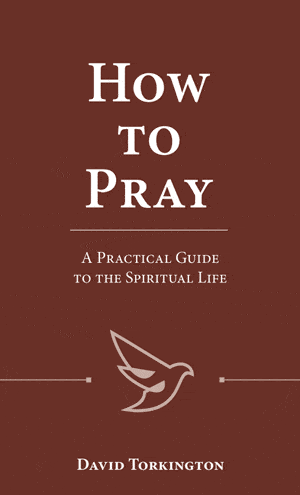 “How to Pray: A Practical Guide to the Spiritual Life” by David Torkington ($12.95) “How to Pray: A Practical Guide to the Spiritual Life” by David Torkington ($12.95)If you desire everyday guidance for entering more deeply into prayer, this book is for you! The forty short, easy-to-read chapters in this guide can be read as a devotional, for meditation, or alongside sacred Scripture. “Living Metanoia: Finding Freedom and Fulfillment in Christ”
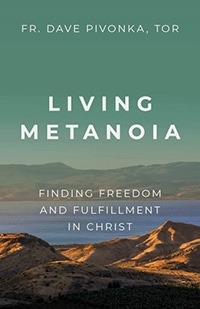 by Father Dave Pivonka, TOR ($18.95) by Father Dave Pivonka, TOR ($18.95)The word “repent” in Greek is metanoia — but the original Greek word means much more than just repentance. It means to change, to turn, to think differently. Metanoia is not a one-time event but a process. “Living Metanoia” explores what this looks like in our daily lives. In either rose or navy, this edition of the familiar prayers of David (the Psalms) and the stories of Christ provides room for journaling along the margins. The synthetic leather cover ensures it will be a treasured spiritual companion for years to come. |


 “Journaling Through the Gospels and Psalms, Catholic Edition”
“Journaling Through the Gospels and Psalms, Catholic Edition”